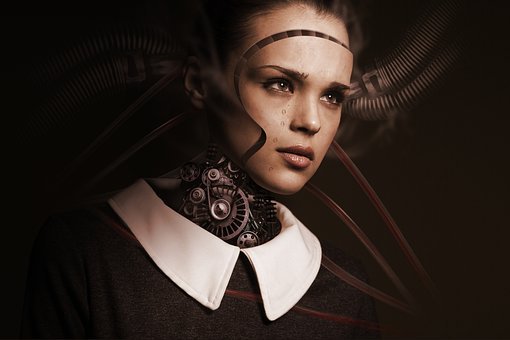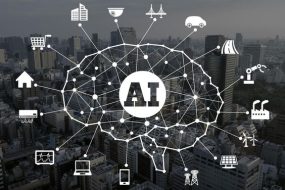
The age of artificial intelligence, machine learning and robotics is here, and these technologies will continue to shape our lives in the future. But the people working in these fields still don’t reflect the society they are bound to change.
Women make up only 22% of AI professionals worldwide, according to analysis done by LinkedIn and the World Economic Forum for its 2018 Global Gender Gap Report. In the more specialized area of machine learning, only 12% are women, based on a study done by Wired in partnership with Montreal startup Element AI.
Artificial intelligence and machine learning continue to be male-dominated fields. But what would an artificially intelligent world designed and led by women look like? From making AI more human to automating the construction industry and reimagining the healthcare sector, here are seven women blazing the trail in the fields of artificial intelligence, machine learning and robotics.
1. Rana el Kaliouby: Creating Emotionally Intelligent AI
She’s the co-founder and CEO of Affectiva, a software company using AI technology to detect emotions through face and voice. The worldwide market for emotion detection and recognition is expected to reach $24.74 billion by 2020.
She led the development of Affectiva’s emotion AI technology, which employs computer vision, deep learning, machine learning and speech processing to recognize emotions from vast amounts of facial data. Before starting Affectiva, el Kaliouby worked as a research scientist at MIT Media Lab. She earned her PhD from the University of Cambridge and her post-doctorate at MIT. She’s part of Fortune Magazine’s 2018 40 Under 40 list as well as Forbes’ 2018 list of America’s Top 50 Women in Tech and is also a 2018 Young Global Leader in the World Economic Forum.
Writing for Forbes, el Kaliouby envisions a future where robots work with humans — not against them. “It may seem far-fetched, but I see AI in partnership with people — helping us do our jobs better, giving us more insights and maybe even making us healthier and happier.” (To learn more about AI’s roots, check out A Brief History of AI.)
2. Fei-Fei Li: Developing Human-Centered AI
Li is one of the brilliant minds in artificial intelligence. She’s currently a professor at Stanford University’s Computer Science Department and co-heads the Stanford Human-Centered AI Institute (HAI), dedicated to advancing AI research and development for the good of humanity. Li also had a brief stint as chief scientist of AI and machine learning at Google Cloud.
She advocates for diversity and inclusion in AI as co-founder and chairperson of nonprofit organization AI4ALL. Li has received numerous awards and recognition for her work, including the 2017 Athena Award for Academic Leadership from University of California’s Women in Technology Initiative, as part of Elle Magazine’s 2017 Women in Tech power list, and as one of Carnegie Foundation’s Great Immigrants of 2016.
In an interview with Wired, Li laid out her vision for HAI: “Above all, I want to see HAI producing a very diverse workforce of AI practitioners, developers, and leaders. And I hope that we can deploy technologies that help humans live better and healthier and work more safely and productively.”
3. Cynthia Breazeal: Making Robots More Social
Breazeal founded and heads the MIT Media Lab’s Personal Robots group and works as an associate professor of media arts and sciences at MIT. As a pioneer in the field of human-robot interaction, Breazeal helped build the now-defunct Jibo, a social robot for the home that uses advanced facial and voice recognition as well as natural language understandingto interact and forge relationships with its human family. She then turned it into a social robotics company with the same name, serving as co-founder and chief scientist.
She has been named as one of the most promising women entrepreneurs by Fortune in 2014 and one of six innovative women to watch by Entrepreneur in 2015. Her Jibo robot has been honored by Time Magazine as one of 2017’s best inventions.
4. Tessa Lau: The Robot Whisperer
Lau is the founder and CEO of Dusty Robotics, a startup which builds robot-powered tools to automate construction tasks and increase efficiency and safety in the construction industry. AI in construction is estimated to be a $2 billion global market by 2023.
Prior to this, she was the co-founder, CTO, and chief robot whisperer at Savioke, a company providing robots for the healthcare, hospitality and logistics industries. Lau also worked at IBM Research for over 10 years.
She obtained her PhD in computer science from the University of Washington. She’s included in Inc.com’s list of top five innovative women to watch in robotics and Fast Company’s 2015 list of most creative people. (For more on robots, check out 5 Defining Qualities of Robots.)
5. Timnit Gebru: Leading the Ethical AI Movement
As a research scientist at Google’s Ethical AI team, Gebru is at the forefront of finding solutions to the ethical issues surrounding artificial intelligence. She completed her post-doctorate at Microsoft Research’s FATE (Fairness, Accountability, Transparency and Ethics) in AI group and earned her PhD from the Stanford Artificial Intelligence Laboratory, with a focus on computer vision under Fei-Fei Li’s supervision. She also worked at Apple, designing circuits and signal processing algorithms for the company’s products.
Gebru’s research on combining deep learning with Google Street View to identify U.S. neighborhood demographics was featured in outlets such as BBC, The Economist and The New York Times, and won her first prize in LDV Capital’s 2017 Entrepreneurial Computer Vision Challenge.
She is a prominent voice in fighting algorithmic bias in AI and an active supporter of diversity in the field through her organization, Black in AI. As Gebru told Forbes, “The positive impacts that you bring to the world don’t have to necessarily be connected to your work. For me, there was also a separate side of me where I was always involved in social justice.”
6. Devi Parikh: Improving the Lives of the Visually Impaired Through AI
Parikh splits her time between Georgia Tech’s School of Interactive Computing as an assistant professor and Facebook AI Research as a research scientist. She obtained her PhD from Carnegie Mellon University and received various awards in the span of her career, including four Google Faculty Research Awards, an Amazon Academic Research Award, and a 2017 Computers and Thought Award from the International Joint Conferences on Artificial Intelligence.
Parikh’s Visual Question Answering research, which uses images to teach a computer to answer questions, combines computer vision, language and artificial intelligence. It has been lauded as having the potential to improve the quality of life for people with visual impairments.
7. Daphne Koller: Transforming Healthcare Through Machine Learning
Koller is the founder and CEO of insitro, a startup applying machine learning to speed up drug discovery and development and make the process cheaper and more efficient. The AI health market’s value is projected at $6.6 billion by 2021.
Before starting insitro, Koller was a professor at Stanford University’s Computer Science Department for over 18 years, then served as chief computing officer at Alphabet’s Calico Labs, a research and development biotech company. She was also the co-founder, co-CEO and president of online learning platform Coursera.
Koller received her PhD from Stanford University and her post-doctorate from UC Berkeley. She is a member of the National Academy of Engineering and a fellow of the American Academy of Arts and Sciences and the International Society for Computational Biology. She was also named one of Time’s 100 most influential people in 2013.
On the intersection of AI with other sectors, Koller told Vogue, “What we’re now seeing is that computational methods are becoming pervasive in so many professions. You can help fishermen in South Africa figure out where to sell their fish or use computing as we’re doing to discover new drugs. There are just so many ways now to have a tremendous impact on society.”









